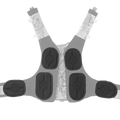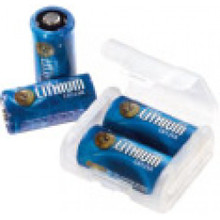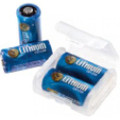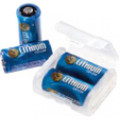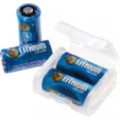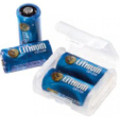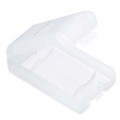 Loading... Please wait...
Loading... Please wait...Categories
- Warehouse Inventory
- GSA Items
- OCIE (Organizational Clothing and Ind. Equipment)
- Packs & Hydration
- MOLLE (Official Issue)
- First Aid Kits and Medical Gear
- Weapon Accessories
- COEI, BII, AAL
- Unit Supplies
- Clothing, Footwear & PPE
- IOTV (Improved Outer Tactical Vest)
- Tactical Gear
- Office Supplies
- Flashlights
- Knives
- Military Tool Sets and SKO's
- Military Antennas
- Tents & Tent Accessories
- Tools & Power Equipment
- Pelican Cases and Lights
- Forensics
- Medals, Awards, and Ribbons
- Property Accountability
Our Newsletter
- Home
- Flashlights
- LED Lighting, High Intensity Lights, Light Accessories, Batteries, CR123A, 12& Link Case (Box), P/N 03028
LED Lighting, High Intensity Lights, Light Accessories, Batteries, CR123A, 12& Link Case (Box), P/N 03028
Product Description
ADVANTAGE: CR123A spiral wound Lithium batteries were designed for use in digital cameras and similar low discharge rate consumer electronics. The cell has the advantage of high energy density compared to more traditional battery chemistries (such as alkaline). The batteries are stable in a wide range of temperatures and have a shelf life of ten years. However, when used in devices such as high intensity flashlights which have a high rate of discharge, internal cell heat can build up. This can result in explosive conditions. The Duracell Battery Company developed the first re-settable current and Thermal Protection System. All ASP batteries incorporate a similar PTC (Positive Thermal Coefficient) device and pressure relief vent. If an ASP battery short circuits or discharges at currents above their design limit, the PTC causes the cells internal resistance to increase, limiting the amount of current that can be drawn and keeping the internal cell temperature within safe limits. The pressure relief vent activates the relieve excessive internal pressure. These internal safety devices increase battery cost. When using CR123A Lithium batteries in a high discharge rate device such as a flashlight, always insist on PTC batteries.
SPECIFICATION: CR123A Lithium batteries Positive Thermal Coefficient (PTC) device Pressure relief vent
PERFORMANCE: A PTC circuit and backup pressure relief vent allow safe operation of CR123A Lithium batteries in high discharge devices such as high intensity LED flashlights.






